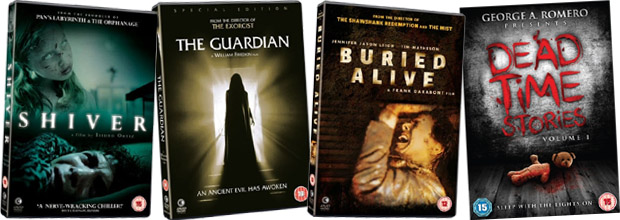
“Boy, Christmas can sure scare the Dickens out of people,” uttered former professional wrestler Bill Goldberg in his festive horror cheesefest Santa’s Slay (geddit?). Unfortunately there’s nothing quite up to those levels of ridiculousness in this gory pre-Yuletide installment of love and loss, terror and terrible.
Still, what we do have this month takes some beating: premature burial, feral women, some exceedingly dodgy childcare and, erm, Nazi zombie horses all have a role to play in this year’s advent.
Kicking off proceedings we have a few efforts from some of the grand masters of the horror genre, Wes Craven, George A. Romero and William Friedkin. Deadly Blessing, Craven’s 1981 suspense thriller set in a Hittite (kind of a stricter Amish) community, bears some of the hallmarks of a great genre piece. Craven regular Michael Berryman (best known as the strange-looking Pluto in The Hills Have Eyes) crops up, as does a particularly pug-faced Ernest Borgnine looking stern as the farm community’s patriarch and a young Sharon Stone. The religious crackpot theme is one well-worn but ripe for the shock and schlock, though this forgettable entry comes up lacking.
Also extremely lacking, with the release of the first volume of George A. Romero’s Dead Time Stories, the septuagenarian legend makes a somewhat feeble return to the three-section portmanteau. Coming across as bite-size nuggets of late night TV movie schtick, these three tales, including one horribly directed by Tom Savini, stink to high heaven, complete with embarrassingly-worded introductions from Romero himself. “If you’re done screaming, we have another story,” he says. No thanks.
The Guardian is more what we’re looking for, despite a heavily cut, compromised feeling that apparently led to William Friedkin disowning it. That old staple, the dodgy childminder, rears its head again in the form of amiable young nanny Camilla (Jenny Seagrove), who has a fondness for Paganism and child sacrifice. With a great score and inventive villainy aided by naughty wolves and trees, it’s a shame the second half feels so rushed, ultimately killing a would-be classic.

Speaking of weird, naked women hanging out in woodland and killing people (aren’t we always?), December brings with it a triad of feral women romps. Belgian Benjamin Vire’s Cannibal begins as an infuriatingly self-consciously stylish thriller about an agoraphobic golfer whose quiet existence in a woodland cottage is disturbed when he discovers the naked Bianca (Helena Coppejans) lying unconscious and covered in blood.
After he nurses her back to health, a disturbing fact about her comes to light (see the film’s subtle title) and so follows an alternative love story embracing sexual deviance and some decent gore to good effect. Unfortunately, this strong story is let down by the sub-Darren Aaronofsky shock-cutting and an ill-advised sojourn to Gallic banlieue grittiness.
Spanish effort Shiver – produced, once again, by Guillermo Del Toro, and packaged as another Pan’s Labyrinth or The Orphanage – is an enjoyable Spanish-language slow-burner. Taking in adolescent awkwardness heightened by the film’s hero, a young man suffering from photophobia (a condition making him unable to go outside in the sun) and some mystery disease giving him almost-fangs, is forced to move to a shadowy mountain village with his mother, where he discovers a somewhat unfriendly little girl in the woods. Said girl has been attacking the villagers and so ensues a touchingly creepy (yet occasionally brutal) tale that unfolds nicely like a mix of early M Night Shyamalan and Let The Right One In. Subtle and cleverly-used references to early film classics, particularly James Whale’s Frankenstein, can’t harm, either.
The Woman, director Lucky McKee’s take on torture-porn, has something of a reputation preceding it. Set in apple pie America, Pollyanna McIntosh plays a bestial lady shot down with a sedative whilst eating in the woods. Naked, caked with dirt and unable to speak any English (instead growling), her captor, family man Chris Cleek (Sean Bridgers), ties her up and takes her to his home’s cellar where he and, under his command, his family, attempt to ‘civilise’ her by cleaning her up, clothing her and trying to tame her. Of course, this leads to many less noble pursuits. McKee’s film has been simultaneously labeled the best horror film of the year and nastily misogynistic in its dwelling on the sadistic, sexual qualities of the action.
To these eyes, The Woman is a great achievement, satisfying as both a blacker-than-black satire (Bridger’s Chris is utterly believable and amusing as the lead) and a genuinely horrifying journey into the abyss. McKee stakes out a kind of depraved modern-day fable commenting on patriarchy and the many ways women have been subjugated by the institutions of the family and (mis-) education, punctuated with lethal, precise bursts of shocking violence.

The empty-minded torture-porn brigade, led by Eli Roth, who likely grew up watching bilge like Ruggero Deodato’s no-longer-banned The House At The Edge Of The Park (also released this month; the boring, offensive, badly-made movie prompted this reviewer to literally destroy the DVD!), should really view this masterclass.
Another film-maker possibly influenced by the likes of Deodato and other video-nasty directors might be Darren Lynn Bousman, whose grim remake of the Troma ‘hit’ Mother’s Day has some inventively nasty set-pieces, making it a superior spin on the ‘party broken up by mad intruders’ formula. Still, with overblown hamminess from The Hand That Rocks The Cradle’s Rebecca De Mornay (note the title’s blatant cash-in) as a criminal matriarch leading her vicious children in the onslaught and not one character you actually care about, this is soon forgotten.
Similarly forgettable is 1990 budget flick Buried Alive from Frank Darabont, producer of The Walking Dead and director of The Mist. Now, Darabont’s covered the dead refusing stay in the ground with his cult TV show; here he features a wronged husband who definitely shouldn’t be kept underground.
Tim Matheson as the typically everyman-y hero provides a decent protagonist seeking revenge on his cheating wife (Jennifer Jason Leigh) and her lover (the nicely slimy William Atherton – remember Walter Peck in Ghostbusters?). Strong performances and a distinctly Stephen King-ish tone (Darabont is a serial King adapter) buckle, though, under the weight of dull soap opera build-up and the general feeling of TV movie-land.
Finishing up this month’s bumper selection, we finally get round to those aforementioned zombie horses in Joel Schumacher’s Blood Creek. Now, everyone knows Schumacher’s been responsible for some turkeys (Batman & Robin may still haunt you), but this tale of a deathless Nazi scientist unleashed on modern-day rural America is one of his occasional successes.
Pairing Magneto and Superman (A.K.A Michael Fassbender and Henry Cavill) as said Nazi monster and the brother of one of his captive blood-sucking vessels is something of a coup (presumably they were both signed up at a budget price before they hit the big-time) as their acting chops come into play. Fassbender is reliably gleeful in this bloodsoaked romp weaving together ancient Norse runes, black magic used to raise dead people, birds and horses (aha!) for nefarious ends, with a bucketload of action. Serious, though enjoyably ridiculous, Schumacher could do well to dabble in more of this sort of thing.
What’s the best horror movie you’ve seen recently? Let us know below…

